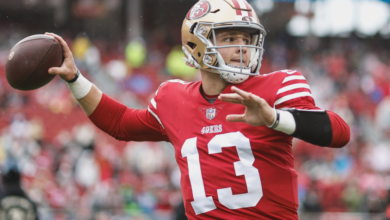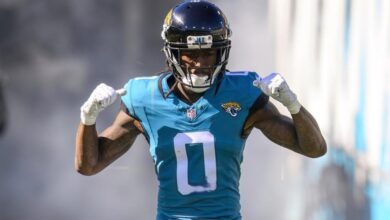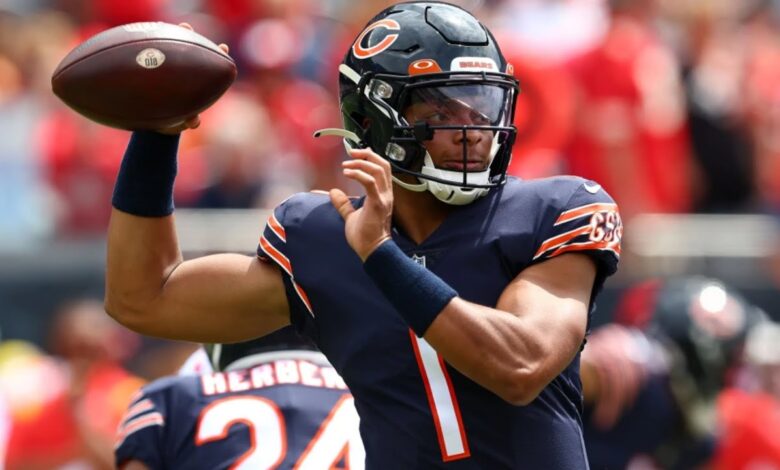
Houston benefits from C.J. Stroud’s rookie deal, but Carolina lost out on trading Brian Burns to the Giants in exchange for a first-round pick.
Now that the first week of NFL free agency has passed, let’s evaluate which clubs improved and which ones declined by naming winners and losers.
Indeed, the Carolina Panthers will be defeated once more. That isn’t a reveal. (You can tell the franchise is in trouble when local celebrities start to doubt the organization’s direction.)
Still, the Panthers received something in exchange for Brian Burns, who was traded to the New York Giants. The Minnesota Vikings were left searching for a primary quarterback after losing Kirk Cousins to free agency for nothing. But the Vikings were ready for the possibility of losing their franchise player (see Panthers, for example), and they acquired Sam Darnold and an additional first-round selection for the 2024 draft in a hurry.
The Philadelphia Eagles and Washington Commanders have had a busy offseason, in contrast to the Dallas Cowboys. However, in the winner’s category, just one of the two NFC East clubs was named.
There was much to do last week, so let’s not spend any more time. These are the first wave of free agency’s winners and losers.
Winners
Texans capitalize on C.J. Stroud’s rookie deal

The Houston Texans and Minnesota Vikings’ non-trade edge rusher exchange highlighted the disparities in their respective offseason circumstances.
It’s possible that some Texans supporters were disappointed to see Jonathan Greenard sign a four-year, $76 million contract with the Vikings. However, the Texans improved a day later when they signed Danielle Hunter to a two-year, $49 million contract with a $48 million guarantee. Upgrade, in my opinion, as he is a proven player ready to assist a club win a Super Bowl right now, which in Houston is a realistic objective thanks to DeMeco Ryans and C.J. Stroud.
The Texans soon understood that given the window they had with Stroud’s rookie deal, they had to play aggressively. Before the star quarterback’s deal comes due, ask the Buffalo Bills, San Diego Chargers, and Cincinnati Bengals how crucial it is to make the most of his rookie contract years.
Though Greenard has only had one strong season since being picked in 2020, the Texans would have had to commit for more than two years if they had paid the three-year-old player. Hunter is a player the Texans know they have, and that may be very beneficial for Will Anderson Jr.’s second season in Houston. Azeez Al-Shaair and Denico Autry were also added to Ryan’s defense last week.
Stroud will gain from the acquisition of Joe Mixon and the re-signing of Dalton Schultz, which will elevate the Texans to the status of serious AFC contenders. I’m not quite ready to declare, though, that they’ll dethrone the Chiefs in the conference. Until the NFL draft is over, let’s make a list of the clubs that could beat Kansas City.
Falcons add weapons after Cousins signing
The more players the Atlanta Falcons sign, the more I support Kirk Cousins’ decision to join the team in Atlanta.
Following Cousins’ signing (four years, $180 million), the Falcons immediately strengthened their receiving corps, which was in dire need of both speed and depth. The Falcons’ terrible passing offense with Taylor Heinicke and Desmond Ridder made the problems less obvious the previous season since they frequently failed to deliver the ball to an open Drake London.
After adding Bijan Robinson and Kyle Pitts to his arsenal in addition to London, Cousins will hammer his receivers. In return for wide receiver Rondale Moore, the Falcons sent Ridder to the Cardinals and acquired Ray-Ray McCloud III, a former 49er who may also be useful on special teams.
Arthur Smith’s three seasons in Atlanta were eventually fatal, but new coach Raheem Morris has already addressed two problems. Now that they have a franchise quarterback, the Falcons have no shortage of wide receiver depth.
Jacksonville Jaguars … for not paying Calvin Ridley

The Jacksonville Jaguars paid wide receiver Gabe Davis $39 million over three years, one of the team’s dubious free agency choices. Calvin Ridley, however, received a hefty four-year, $92 million contract with $50 million guaranteed to join the Tennessee Titans, so at least they didn’t overpay for him.
Although Ridley’s departure is painful, the Jaguars won’t be wondering in a year or two why they spent so much money on a player who was approaching 30 and had only two seasons with 1,000 yards.
Maybe Ridley is worth the money and performs well with Will Levis in Tennessee, but in the end, the team that doesn’t go over budget usually emerges victorious. Along with Christian Kirk and Davis, the Jaguars may pick a wide receiver to replace Ridley.
Regarding the Titans, they are not included in the story’s losers section. With the addition of cornerback Chidobe Awuzie, running back Tony Pollard, and center Lloyd Cushenberry, they enjoyed a successful free agency.
Commanders’ smart, underrated signings
The Commanders’ roster is riddled with weaknesses, making them seem like the awful club that spends outrageous amounts of money in free agency.
However, they don’t squander money aimlessly. These are astute bargains on guys that have potential. Although he isn’t well-known, Dallas edge rusher Dorance Armstrong (three years, up to $45 million) frequently took advantage of his opportunity to play behind Micah Parsons and DeMarcus Lawrence. If Armstrong, a 26-year-old, is on par with Greenard and Bryce Huff—two developing edge rushers who received raises last week—that wouldn’t be shocking.
In addition to Armstrong, the other Washington additions were less expensive; these acquisitions might aid a defense in dire need of support as well as the incoming rookie quarterback.
These are the noteworthy new hires: Running back Austin Ekeler (two years, $11.43 million), linebacker Bobby Wagner (one year, $6 million in guarantees), linebacker Frankie Luvu (three years, $36 million), guard Nick Allegretti (three years, $16 million), center Tyler Biadasz (three years, $30 million), and safety Jeremy Chinn (one year, $4.1 million) are the players in this scenario.
The nation’s capital is in a new age.
Lions address defensive issues
Speaking of new eras, the Detroit Lions are behaving like Super Bowl candidates.
The Lions have addressed their defensive shortcomings and haven’t become comfortable following their run to the NFC championship game. The defensive backs Cameron Sutton, Emmanuel Moseley, and C.J. Gardner-Johnson—who departed to rejoin the Philadelphia Eagles—that they signed last year didn’t yield anything for them.
Carlton Davis III, who was traded to Detroit by the Tampa Bay Buccaneers, will challenge Sutton and Moseley, who re-signed on a one-year agreement, for snaps. Amik Robertson, a slot cornerback with the Las Vegas Raiders the previous season, was another versatile defensive back acquired by the Lions.
However, the defense’s back end did not represent the only area of progress. Aidan Hutchinson, Alim McNeill, and defensive lineman D.J. Reader were joined by edge rusher Marcus Davenport in the front line. The Lions may make a compelling argument for having one of the greatest rosters in the NFL with a better defense.
Vikings start their post-Cousins strategy and receive an additional first-round selection
Once the Vikings lost Cousins to the Falcons in free agency, they were faced with an unsettling quarterback situation. It appeared as though Darnold would be the starting quarterback for the Vikings in 2024. That’s the reason a lot of tweets and articles on Justin Jefferson’s potential trade request were released.
Regardless of the Vikings’ post-Cousins strategy for this season, Jefferson was not going to be traded. The Vikings look to have a quarterbacking strategy that works, which might please the wide receiver who will soon earn the biggest salary. After surrendering Houston’s second-round selections this year and next, along with a sixth-round pick (No. 188) in 2024, Minnesota received an additional first-round pick in the draft the following month.
With the Nos. 11 and 23 choices, the Vikings may now potentially jump into the top five in the draft. It’s unclear if that would be sufficient to be in the top three, as the Patriots, Commanders, and Bears all appear intent on choosing a quarterback. However, it may be sufficient to secure the No. 5 selection by the Chargers and perhaps choose Michigan’s, J.J. McCarthy.
The Vikings would be well on their way to letting go of Cousins if they coupled a bridge quarterback in Darnold with an interesting first-round quarterback. In 2024, the club may also have a strong defense, which would relieve some of the strain on Darnold and the unnamed rookie quarterback.
The Vikings strengthened Brian Flores’ defense with Greenard, Blake Cashman, and Andrew Van Ginkel. Along with Jefferson, Jordan Addison, and tight end T.J. Hockenson, the offense will welcome back former Packers running back Aaron Jones.
Losers
Panthers with more head-scratching decisions
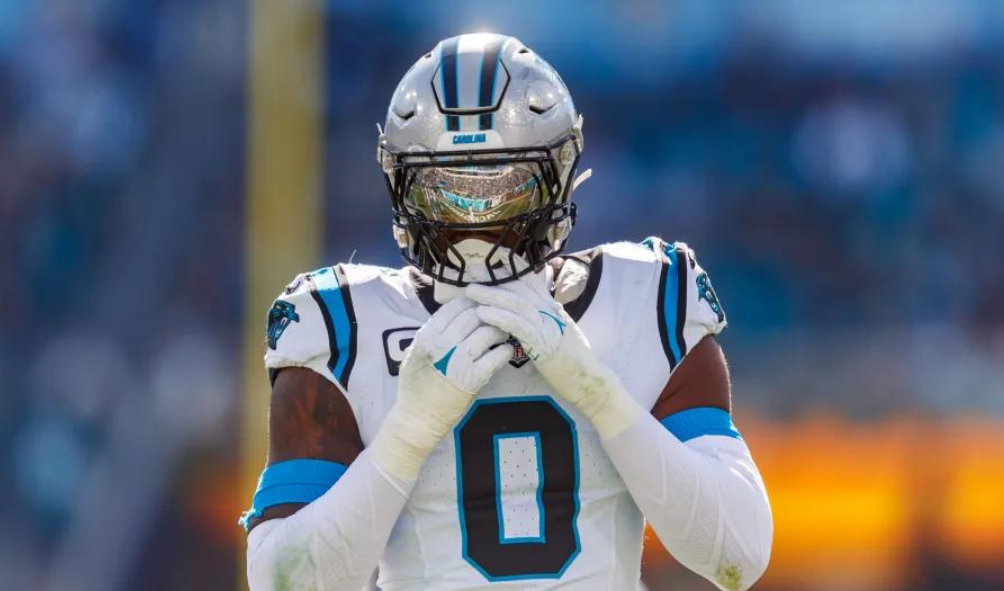
Luke Combs, a country music artist, ought to launch his own Panthers blog since he provided a thoughtful critique of the team’s choice to deal Burns to the Giants.
“What are we doing?” Combs used a lot of question marks and exclamation points in his writing. “Christian McCaffrey wasn’t selected in the first round a few years ago, and Burns isn’t getting one now?”
Fair enough, especially considering that in October 2022 the Rams made the Panthers an offer of two first-round selections in exchange for Burns. Before shipping Burns to the Giants in exchange for second and fifth-round selections in 2023, the organization decided not to move Burns during the trade deadline.
That is only a result of the organization’s indecision and general lack of preparation. Although it seems sense that the Panthers were reluctant to give Burns a $150 million contract, that situation ought to have been brought up in October when Burns’ worth was far higher.
Eagles’ risky splash moves
Since the Eagles were able to keep edge rusher Josh Sweat, and since their defense will now be less of a mystery, I’m a little reluctant to critique their free-agency decisions. However, the Eagles overpaid players who aren’t linebackers or cornerbacks and took too many chances.
Thoughts are understood, though. The greatest players to fill a need are frequently the younger ones selected in the draft. Therefore, the Eagles, who had started the season 10-1 but had collapsed in the second half, may discover gems in the draft to strengthen the defense and, should they deal edge rusher Haason Reddick, could get a few selections.
Though Bryce Huff signed a three-year, $51.1 million contract, the Eagles did not need to spend big if they planned to sign Sweat again on a restructured deal. The Eagles have already acquired Nolan Smith with a first-round pick in 2023. And although Smith may not be ready to start regularly following a quiet rookie campaign, the Eagles took a risk by selecting Huff, a Jets rotational player from the previous campaign.
Instead of paying linebacker Patrick Queen, the Eagles would have been better suited keeping with their current group of edge rushers. Rather, the Eagles decided to take a second chance on Devin White, a linebacker who was benched in Tampa during the previous season. White, who hasn’t competed at a Pro Bowl level since 2021, signed a $7.5 million, one-year contract with the Eagles.
Regarding the $37.75 million, three-year contract that the team signed Saquon Barkley, they overpaid for a running back who has suffered injuries and hasn’t had a significant effect on the field in recent seasons. However, he was playing for the Giants, who had a mediocre bunch of pass catchers and a poor quarterback in Daniel Jones.
Barkley could be a great addition to the Eagles offense, but like with Huff’s signing, the money could have been better used to acquire defensive backs and linebackers. The Eagles’ acquisition of quarterback Kenny Pickett carries danger as well, but at least he won’t be expected to start. Out of all the additions the Eagles have made in the last seven days, Pickett’s acquisition seems to make the most sense.
Bears mishandle Justin Fields’s development, trade
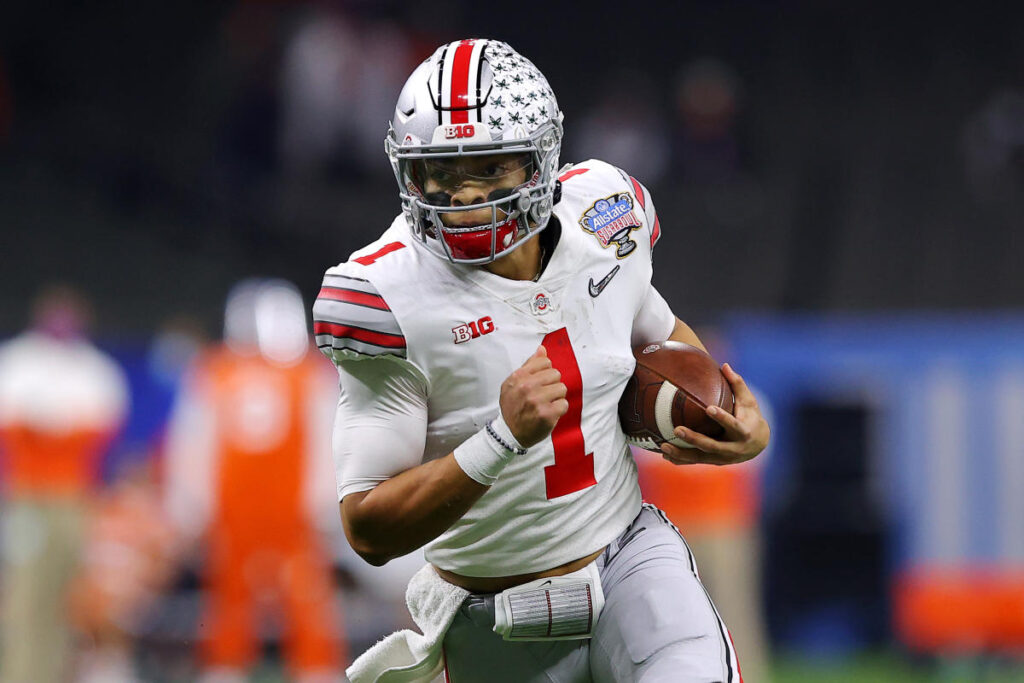
The unrealized potential will be associated with the Justin Fields period, in part due to the Chicago Bears’ poor management of creating a conducive environment.
Fields is currently Russell Wilson’s backup quarterback in Pittsburgh after failing to establish himself as a star. In exchange, the Bears received a sixth-round pick in 2025 (which drops to a fourth-round pick if Fields plays at least 51% of the snaps in ’24).
Fields’ patchy passing statistics are partly to blame for his inability to succeed in Chicago. But despite unfavorable circumstances, the energetic athlete carried the squad several times. For a guy with so much unrealized talent that helped the Bears win four of their final six games in 2023, the team was unable to even secure a Day-2 pick.
Chicago made the perfect choice by selecting Caleb Williams of USC as the first pick in next month’s draft, which will likely include a quarterback. With the signings of Gerald Everett and D’Andre Swift, the re-signing of Jaylon Johnson, and the trade for Keenan Allen, they have also had a successful free agency.
However, the Bears mishandled the trade of Fields, holding off on sending him to the Steelers—a low-risk, high-reward acquisition—until the very last minute of free agency. Chicago might have waited for a QB-needy team to come up with a stronger offer for Fields until training camp. On the rare occasions that they did Fields the favor of not making him wait, they instead grabbed what they could get.
Dolphins’ all-in approach backfires
The losses of Christian Wilkins, Robert Hunt, and Van Ginkel in free agency cost the Miami Dolphins a great deal of skill.
Their recent aggressiveness, which included dealing for Tyreek Hill, Jalen Ramsey, and Bradley Chubb, meant they couldn’t afford to retain their best internal free agents. Their limited cap space and two wild-card defeats over the previous two seasons are the only results of this all-in strategy.
Due to Tua Tagovailoa’s impending huge payday this spring or summer, the Dolphins can no longer afford to rely only on his rookie deal because their roster is now weaker.
The Dolphins regressed a bit, but they did add some noteworthy players, like Jordyn Brooks, cornerback Kendall Fuller, and a couple of others who may be nearing the end of their careers. To defeat the Bills in the AFC East, it probably won’t be enough.


